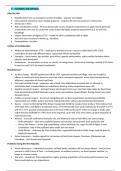5) FOUNDING THE REPUBLIC
After the War
Republicanism seen as acceptance system of politics – popular sovereignty
Many patriots refused to return loyalist property – congress did not have powers to enforce this
Democrats v elites
State constitutions varied – PA most democratic no gov, property requirements or upper house, generally
2/3rds white men over 21 could vote, some states had higher property requirements e.g. SC with Gov
Routledge
Virginia Declaration of Rights (1776) – model for other constitutions bills of rights
New men more involved in North e.g., Hamilton
Cosmopolitans v localists
Articles of Confederation
Written by John Dickinson 1776 – weak gov to prevent tyranny, 6 years to ratify (last by MA 1781),
committees to deal with different topics, supervised military during WOI
Strengths – issue money, sign treaties, post offices, appoint ambassadors, settle conflicts between states,
effective land distribution
Weaknesses – no executive, no army, no courts, no taxing power, states were sovereign, needed 9/13 states
to pass law and 13/13 to amend constitution
Revolutionary?
Societal change – 80,000 loyalists had left by 1783, opposed hereditary privilege, new men in politics,
officers in continental army based on merit not status, westward expansion, some states banned slavery,
Jefferson’s separation of Church and State
Not much societal change – expensive sale of land, class distinctions accepted with no attempt to
redistribute land, remained based on subsistence farming, many congressmen were rich
Negative economic impact – damaged towns and property from war, merchant ships stolen by Royal Navy,
trade devastated by British blockades and no more mercantilism, hyperinflation, fleeing slaves from south
disrupted farms
Positive economic impact – freed from Navigation Acts so direct exportation, privateering profitable,
regenerated iron, textile, pottery and shoe making industries, military demand boosted production
Slavery – one in six fled during WOI, Britain transported 20,000 to Canada, Nova Scotia or West Indies, from
1777 black men could fight in Continental army, 1771 MA banned slave trade, followed by RI and CT in 1774
and VT in 1777, gradual emancipation laws in PA from 1780 and RI and CT 1784, no change in South, after
cotton became profitable in 1790s more were imported, up to 42% of SC were slaves, gradual relaxation of
manumission laws
Women – most still confined to domestic role, not allowed to vote or hold office, but some change:
- Phillis Wheatley – slave who published poetry and was then emancipated, work praised by GW
- Mercy Otis Warren – writer and pamphleteer, critical of British rule, urged for Bill of Rights in new
constitution, later in life published plays under her own name
- Molly Pitcher – nickname for Mary Ludwig Hays, supported husband at Valley Forge, took his place in
Battle of Monmouth
Native Americans – treaties signed for concessions of land from Iroquois, Choctaws, Chickasaws and
Cherokees – Fort Stanwix and Hopewell
Problems Facing the New Republic
Weak national gov – intermittent sessions, no fixed abode, members did not always attend – only just met
quorum to ratify Treaty of Paris – no taxing power, no national currency, no direct popular election, no
longer a common enemy
The west – spread into Trans-Appalachian region, growing populations of Kentucky and Tennessee, fear
these would declare own impendence:





